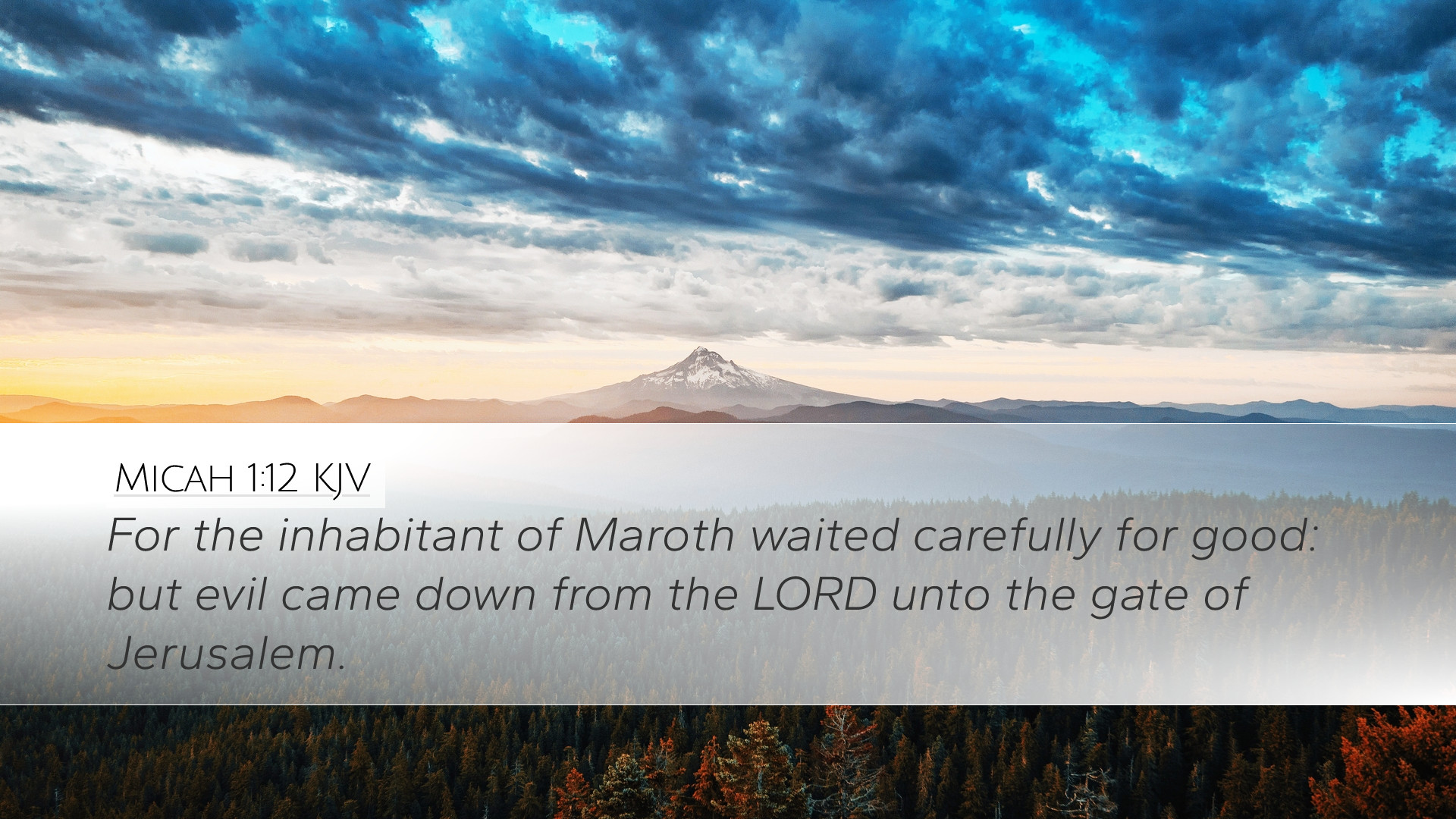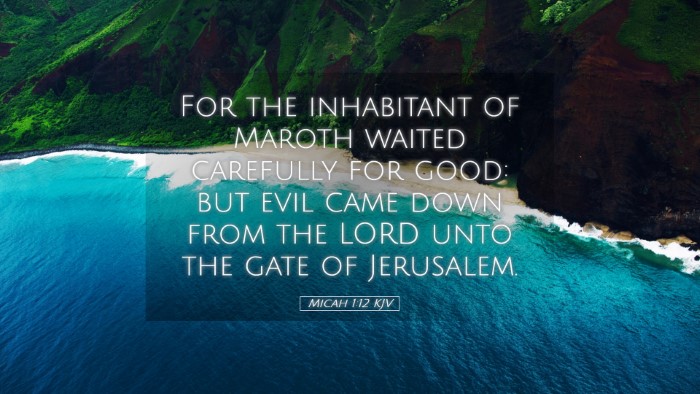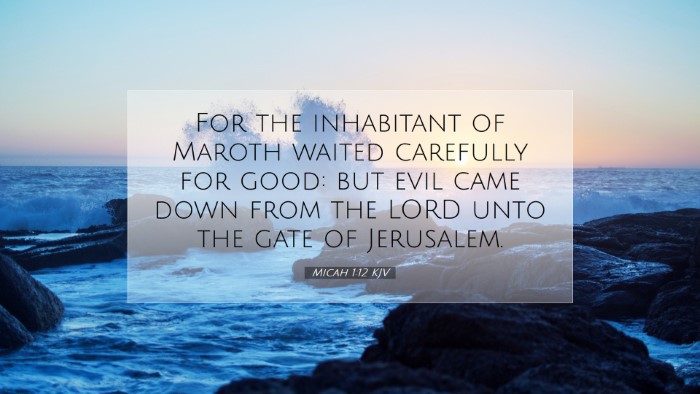Old Testament
Genesis Exodus Leviticus Numbers Deuteronomy Joshua Judges Ruth 1 Samuel 2 Samuel 1 Kings 2 Kings 1 Chronicles 2 Chronicles Ezra Nehemiah Esther Job Psalms Proverbs Ecclesiastes Song of Solomon Isaiah Jeremiah Lamentations Ezekiel Daniel Hosea Joel Amos Obadiah Jonah Micah Nahum Habakkuk Zephaniah Haggai Zechariah MalachiMicah 1:12
Micah 1:12 KJV
For the inhabitant of Maroth waited carefully for good: but evil came down from the LORD unto the gate of Jerusalem.
Micah 1:12 Bible Commentary
Commentary on Micah 1:12
Bible Verse: Micah 1:12 - "For the inhabitants of Maroth waited carefully for good: but evil came down from the LORD unto the gate of Jerusalem."
Contextual Overview
The Book of Micah is a prophetic literary work that addresses the southern kingdom of Judah during a time of social injustice, corruption, and impending judgment. Micah prophesied during the 8th century BCE, a period marked by both political turmoil and the spiritual decline of Israel. The opening chapter describes the imminent judgment against Israel and Judah, conveying a sense of urgency and a call for repentance.
Insights from Commentaries
Matthew Henry's Commentary
Matthew Henry highlights the significance of the city of Maroth, suggesting that this town symbolizes a place of expectation. The inhabitants there were anticipating good outcomes, yet the prophecy indicates that rather than good, they would face adversity. Henry posits that the name 'Maroth' can be interpreted as "bitter," hinting at the disillusionment that would follow. He emphasizes that the reliance on mere expectations of divine favor without true repentance can lead to disappointment and calamity.
- Expectation and Reality: The juxtaposition of hope and despair serves as a powerful reminder that human expectations do not dictate divine outcomes.
- Divine Judgment: Henry underlines that the evil which came from the Lord represents divine judgment—just as God can bestow grace, He can also withdraw it in times of injustice.
Albert Barnes' Notes on the Bible
Albert Barnes provides a detailed analysis of the phrase “waited carefully for good.” He suggests that the people of Maroth were not just passive in their waiting; rather, they were actively seeking righteousness and deliverance. However, Barnes warns that their waiting reflects a misunderstanding of how God’s justice operates. The elusive blessings they hoped for were overshadowed by the encroaching judgment of God, marking a pivotal moment where expectations come crashing down due to their obstinate disregard for God’s commands.
- Active Seeking: The careful waiting implies that the people were earnest but unsuccessful in their pursuit of good.
- Moral Reckoning: Barnes stresses that the passage is a moral reckoning, an admonition for all who seek the good without the righteousness that aligns with God's will.
Adam Clarke's Commentary
Clarke delves into the prophetic rhetoric of Micah, emphasizing that the judgment portrayed here is both imminent and deserved due to the moral failings of God's people. He interprets the phrase “evil came down from the LORD” as a direct act of divine justice, asserting that God does not act capriciously but in accordance with His holiness. Clarke also notes the phrase underscores a critical theme in prophetic literature: that blessings and calamities are often interconnected based on the fidelity of the people to their covenant with God.
- Divine Sovereignty: Clarke elucidates the sovereignty of God in both grace and judgment, pointing out that His goodness is universal, while His specific interventions are tied to human responses.
- Covenant Relationship: The surrounding context requires a deep understanding of the covenant relationship that God has with Israel, where obedience results in blessing and disobedience leads to judgment.
Theological Implications
Micaiah 1:12 presents several theological themes relevant for today's readers, including:
- Expectation vs. Reality: The anticipation of blessings must be grounded in the reality of living righteously. The reality of faith requires not just waiting but actively pursuing holiness.
- Judgment and Mercy: The duality of God's nature as both judge and savior remains prevalent. His judgment is a necessary part of a just God who cannot overlook sin.
- The Call to Repentance: The passage serves as an enduring call towards repentance—recognizing that true restoration comes when the people turn from evil and seek the good.
Conclusion
Micah 1:12 is more than a historical reference; it carries profound implications for contemporary faith communities. The prophetic voices of Henry, Barnes, and Clarke converge to remind readers that our expectations of God's goodness must align with a commitment to moral integrity and covenant faithfulness. As such, this verse challenges readers—pastors, scholars, and laypersons alike—to reflect upon their own lives, the condition of their communities, and the nature of their relationship with God in light of His sovereign will.


